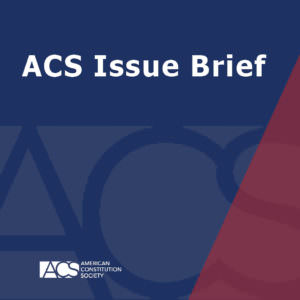Are We Closer to Fulfilling Gideon’s Promise?: The Effects of the Supreme Court’s ‘Right-to-Counsel Term’
Vice President of Policy and Program
January 10, 2013
 ACS is pleased to distribute “Are We Closer to Fulfilling Gideon’s Promise?: The Effects of the Supreme Court’s ‘Right-to-Counsel Term’” by Christopher Durocher, Government Affairs Counsel at The Constitution Project.
ACS is pleased to distribute “Are We Closer to Fulfilling Gideon’s Promise?: The Effects of the Supreme Court’s ‘Right-to-Counsel Term’” by Christopher Durocher, Government Affairs Counsel at The Constitution Project.
This year marks the 50th anniversary of Gideon vs. Wainwright, the landmark case in which the U.S. Supreme Court rendered a unanimous opinion declaring that “any person haled into court, who is too poor to hire a lawyer, cannot be assured a fair trial unless counsel is provided for him.” Since this decision on March 18, 1963, the right to counsel has evolved, with increased clarification given to the meaning of the Sixth Amendment just last year. As Durocher explains in the Issue Brief, the “Supreme Court handed down decisions in five cases that open the door to expanding and better protecting the availability of effective counsel in both the pre-trial and post-conviction stages.” Given the sheer number of cases the Court reviewed in this area of law, Durocher concludes, “the Court’s last term deserved the sobriquet the ‘Right-to-Counsel Term.’”
This Issue Brief examines the five “Right-to-Counsel Term” decisions and subsequent lower courts’ application of those decisions. Last Term, the Court clarified the constitutional right to effective lawyers during plea negotiations. Durocher writes, “the Court correctly acknowledged that plea bargaining is now the defining feature of the criminal justice system,” which may have “significant practical impact on the way in which plea bargaining is conducted.” And though the Court does not recognize a constitutional right to post-conviction counsel, last Term the Court took “incremental step[s] towards establishing some protections in critical post-conviction proceedings,” Durocher finds.
With these additional Sixth Amendment protections, comes increased strain to indigent defense systems, Durocher acknowledges. “It is well-documented that indigent defense providers across the nation are overworked and have too few resources.” Lower courts can aggressively apply the Court’s decisions to ensure indigent defendants are adequately represented, giving true meaning to the Sixth Amendment.
Read the full Issue Brief here: Are We Closer to Fulfilling Gideon’s Promise?: The Effects of the Supreme Court’s ‘Right-to-Counsel Term
